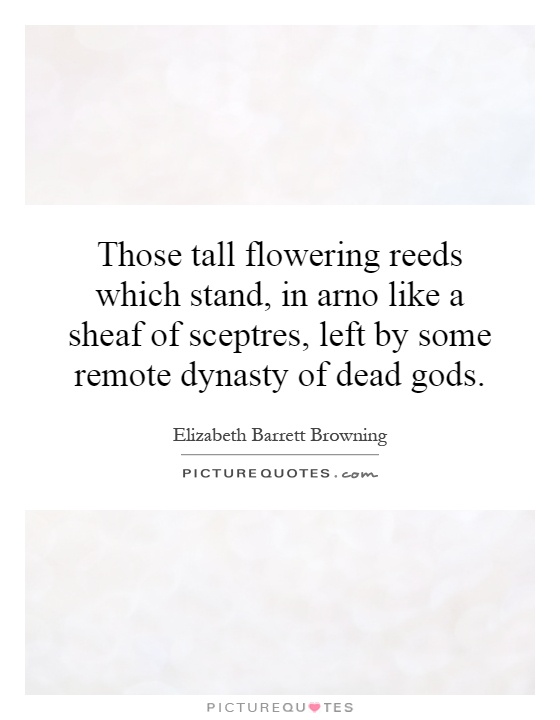Those tall flowering reeds which stand, in arno like a sheaf of sceptres, left by some remote dynasty of dead gods

Those tall flowering reeds which stand, in arno like a sheaf of sceptres, left by some remote dynasty of dead gods
Elizabeth Barrett Browning was a poet known for her vivid imagery and powerful language, and her description of the tall flowering reeds in the Arno River is no exception. In her poem "Casa Guidi Windows," Browning paints a striking picture of these reeds, comparing them to a sheaf of sceptres left by a remote dynasty of dead gods.The use of the word "sceptres" in this context is particularly evocative. Sceptres are symbols of power and authority, often associated with royalty or divine rulers. By likening the reeds to sceptres, Browning imbues them with a sense of majesty and grandeur. They stand tall and proud in the river, a reminder of a bygone era when gods walked the earth and held sway over mortal affairs.
The image of the reeds as a sheaf further emphasizes their regal nature. A sheaf is a bundle of grain or other crops, often tied together for storage or transport. In this case, the reeds are gathered together like a sheaf of sceptres, creating a striking visual image of strength and unity. They stand as a collective, a united front against the passage of time and the changing tides of history.
The mention of a remote dynasty of dead gods adds a layer of mystery and intrigue to the poem. Who were these gods, and what power did they wield? What secrets do the reeds hold, standing as silent sentinels in the river? Browning leaves these questions unanswered, inviting the reader to ponder the deeper meaning behind her words.
Overall, Browning's description of the tall flowering reeds in the Arno River is a powerful and evocative one. Through her use of vivid imagery and rich language, she brings to life a scene of ancient grandeur and timeless beauty. The reeds stand as a testament to the enduring power of nature and the mysteries of the past, a reminder of the gods who once ruled the world.












 Friendship Quotes
Friendship Quotes Love Quotes
Love Quotes Life Quotes
Life Quotes Funny Quotes
Funny Quotes Motivational Quotes
Motivational Quotes Inspirational Quotes
Inspirational Quotes